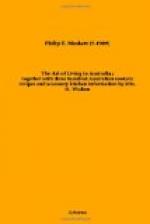There was a great controversy as to the proper way of making tea in the medical papers not very long ago. It is of course a perennial topic, and always excites considerable interest. This particular discussion began in this way. A new tea-pot, called the anti-tannic tea-pot, appeared on the scene, and was favoured with a long description by the British medical journal. It was claimed for this special model that it extracted only the theine, and not the tannin from the tea. Now, as a matter of fact, it is simply impossible to make tea, no matter how it is made, entirely free from tannin. It is quite true that many suppose by infusing the tea for a very brief period only—two or three minutes —the passage of the tannin into the beverage can be prevented, but, as Sir William Roberts has pointed out, this is quite a delusion. Tannin is one of the most soluble substances known, and melts in hot water just as sugar does. Tea made experimentally, by pouring boiling water on the dry leaves placed on filter paper, contains tannin. As Sir William remarks, you can no more have tea without tannin, than you can have wine without alcohol.
Nevertheless, it is a fact that this anti-tannic tea-pot has many excellent points about it, and is sure to meet with favour. It is really an attempt to make tea by a more certain method than is generally employed; for I think it must be admitted that the present happy-go-lucky style has not much to recommend it. On one occasion the tea will be excellent—and on another either as weak as water, or with such a sharp acrid taste that it is almost undrinkable. In the latter case the tea has been allowed to soak so long that it has become a decoction instead of an infusion. The consequence of this prolonged action of the hot water on the tea is that it brings out the bitter extractive material of the plant, and it is this which proves so particularly pernicious. Tea at sea is proverbially unpalatable, and invariably disagrees, owing chiefly to the fact that it is a boiled decoction of tea leaves and nothing else.
COFFEE
Coffee is the roasted and ground product of the seeds found within the fruit of a tree, the Coffea Arabica. Originally a native of Abyssinia, it was transported into Arabia at the beginning of the fifteenth century. Since then it has been widely cultivated in the West Indies, in Ceylon, and in other warm countries. The fruit itself much resembles a small cherry in size and appearance, and usually contains two small seeds—the coffee beans themselves. The choicest coffee is the mocha or Arabian coffee, and the bean is very small. Of the West Indian varieties, the Jamaica and the Martinique coffee are the best. The exhilarating and agreeable properties of coffee are dependent in great part upon three active principles which it contains. The first of these is caffeine, which is almost identical in composition




